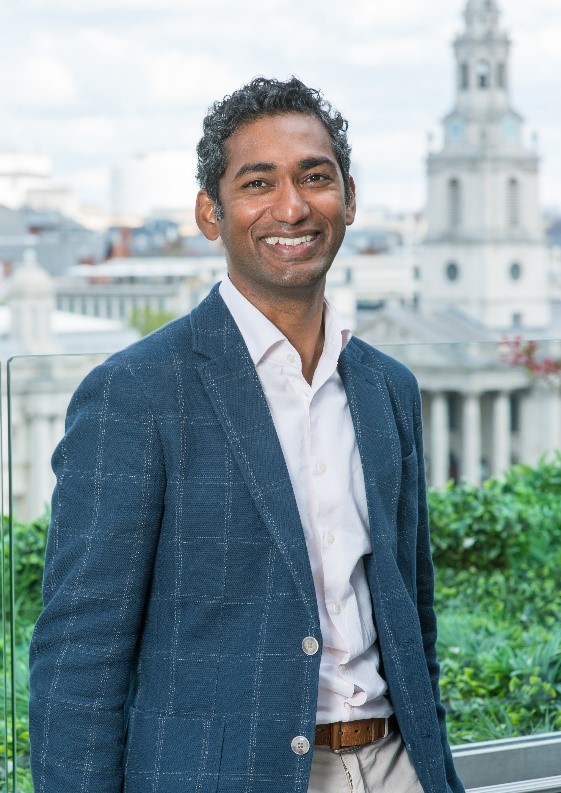
In 2017, EO pledged its support of the United Nations Sustainable Development Goals (UN SDGs)—17 goals to wipe out poverty, fight inequality and tackle climate change by 2030. To inspire EO members to focus on sustainability and societal impact, EO hosts a quarterly Impact Day. The next EO Impact Day is Wednesday, 15 December 2021.
Pajani Singah, president of EO London, embraces the UN SDGs by fighting climate change. He was recently honoured for his actions: Pajani is co-founder of Amazonia Impact Ventures (AIV), which was selected by the World Economic Forum (WEF) as a winner of the Tropical Forest Commodities Challenge. The recognition was given for AIV’s innovative approach using finance to tackle deforestation in the Amazon rainforest.
Addressing deforestation in the Amazon
The Amazon rainforest absorbs two billion tons of carbon per year. At its current rate of deforestation, over 25 percent of the biome will disappear by 2030. Urgent action is needed to stop such rampant deforestation. Work by the voluntary sector alone will not be enough; businesses must get involved, too. Recent years have seen promising work in the sustainable investment space, but greenwashing remains all too common.
Amazonia Impact Ventures (AIV) invests private capital in projects that reduce deforestation, regenerate biodiversity and restore degraded land to mitigate climate change. The organization works with smallholder farmers’ organizations to reduce commodity-driven deforestation. Their work helps indigenous peoples and local communities protect and regenerate the Amazon rainforest.
Pajani has set out to demonstrate that investing sustainably doesn’t have to mean sacrificing profit. Along with co-founder Aldo Soto, a biologist with 15 years’ experience supporting indigenous Amazonian communities to protect their lands from illegal deforestation, he set up AIV. The venture group selects enterprises that can use capital investment to increase financial returns, protect the forest, benefit their community, and deliver a return to investors.
Using sustainable finance to support indigenous communities
“Indigenous communities often struggle to access traditional bank financing, in part due to prohibitively high interest rates and a lack of collateral,” Pajani explained. “AIV supports these communities by making loans available to grow sales, open new business opportunities for responsibility-grown commodities, acquire land deeds, and finance legal representation to protect lands from deforestation. These loans provide results-based incentives to meet environmental and social targets such as improving land use, reducing deforestation, and improving farmers’ incomes.”
In addition to financing, AIV provides technical assistance for sustainable land practices and loans to improve productivity. AIV works closely with indigenous communities to provide the financial support needed to expand agroforestry and reforestation on their land. These efforts result in large areas of community land that can be protected and regenerated over time–while stopping illegal deforestation at the same time.
We asked Pajani about the project:
What inspired you to take action and form AIV?
In 2019, I attended EO’s Global Leadership Conference in Macau, China. I heard Daniel Epstein from Unreasonable speak about VCs investing in impact companies. It triggered me to explore how I, as an entrepreneur, can make a difference in the world. I later attended a Social Finance course at Saïd Business School, Oxford University, where I learned more about the UN SDGs and how to apply social finance models to businesses.
How will being named one of the World Economic Forum’s Top 5 Innovators in the Tropical Forest Commodities Challenge enhance AIV’s efforts?
We’re excited to have the World Economic Forum’s recognition and significant support. Hopefully, this recognition demonstrates that, after one year of investing our own money, our model proves how investors can make a direct impact and still earn a positive return while addressing climate change. Part of our theory of change is to attract capital away from polluting industries and into sustainable ones.
What’s been the biggest surprise you’ve encountered since forming AIV?
The absolute need in the communities for the finance we provide for their livelihood. Indigenous communities face enormous difficulty in obtaining financing because they are not part of the banking system and have no credit record.
What will you share with EO members who want to start their journey in supporting the UN SDGs?
Start by looking within your business to discover how simple changes can have a significant impact on the SDGs. The framework around your business model, planning and strategy must consider your impact on the planet. EO Impact Day and the COP26 focus on net-zero targets are good places to find information.
Join us for EO Impact Day
The next EO Impact Day takes place on 15 December 2021. It will feature the World Economic Forum (WEF) to showcase the social impact created by small and medium-sized enterprises (SMEs). In collaboration with EO and academic partners, WEF published a report on 30 November 2021 on the future-readiness of SMEs. This report features various case studies from EO members, which will be discussed during the EO Impact Day session.
Sign up to attend EO Impact Day, and complete the interest form for EO’s Inspire, Learn, Act series to continue your EO impact journey. You can also join the MyEO Sustainable Business group. And we encourage EO members to share your EO impact story!
Categories: Best Practices Crisis Entrepreneurial Journey Impact international Make a Mark
